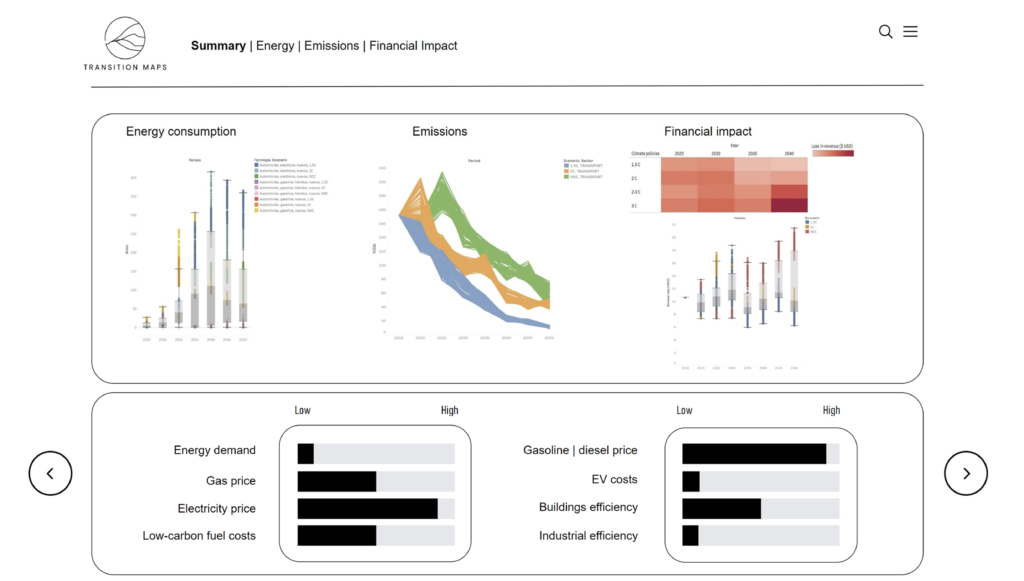Companies need to have credible decarbonisation strategies.
This involves model-based assessments to facilitate robust decision-making under deep uncertainty.
Our approach involves modelling tailored decarbonization pathways for each company under a wide range of scenarios and assumptions about future commodity prices, technologies, policies and other key variables.
Besides evaluating the cost-effectiveness of these decarbonization pathways, we assess their evolvability and robustness using our adaptive robust-decision making approach.
Additionally, we provide insights on the financial impact of these decarbonization pathways on companies to better inform their strategic decision-making process.
At Transition Maps we build model-based scenarios to explore decarbonization pathways and create cost-efficient, robust and flexible transition roadmaps tailored for companies.
Our process to create decarbonization roadmaps involves the following steps:


1) Estimate emissions profile
An emissions baseline provides a quantifiable measure of the amount of greenhouse gases (GHGs) a company emits within a specific timeframe.
This benchmark is crucial for understanding the scale of a company’s environmental impact and for measuring progress over time.
2) Set up decarbonisation targets
With a clear understanding of current emissions levels, companies can set informed, realistic, and achievable decarbonization targets. These targets can be aligned with international agreements like the Paris Agreement, science-based targets, or internal sustainability goals.
We determine the necessary reduction in emissions from the baseline year to the target year. This calculation takes into account the company’s sector and its decarbonization goals.
3) Model decarbonisation pathways
The energy system is a complex interconnection of supply, demand, infrastructure, and environmental impacts. Models help in understanding how these elements interact over time under different scenarios.
Developing a tailored energy systems model of your company allows us to explore a wide range of decarbonization pathways under different climate targets. This is essential for developing strategic, cost-effective, and technologically feasible plans to reduce carbon emissions.
4) Explore and visualise scenarios
Besides modelling decarbonization pathways under different climate ambitions, we carry out an uncertainty analysis to better understand your company’s energy system. We run your company’s model to explore how transition pathways change under various assumptions about the future. Besides energy consumption, fuel use, technology mix by sector and emissions under different scenarios, users can visualize the financial impact of the modelled scenarios on the company baseline.


5) Creative adaptive pathways
Cost-effectiveness is an important selection criteria for decarbonization pathways. However, it’s not the only relevant measure related to energy system architecture features; evolvability and robustness also matter. We estimate the ability of the system to work satisfactorily under a range of different transition scenarios and to change course over the medium to longer term using a Robust Decision Making (RDM) approach.
When new information arrives about the company’s internal operations or the external environment, it’s time to reassess the previously chosen transition strategy. New regulations, high energy prices or high energy demand might all trigger adjustments to a company’s decarbonization strategy.
The dynamic and adaptive nature of our approach helps ensure that companies remain resilient and able to achieve their long-term objectives despite uncertainties.

